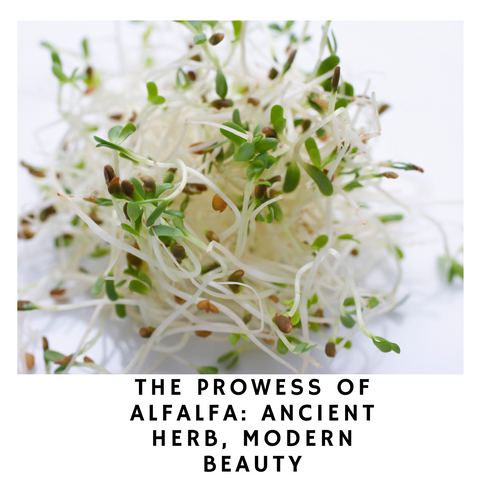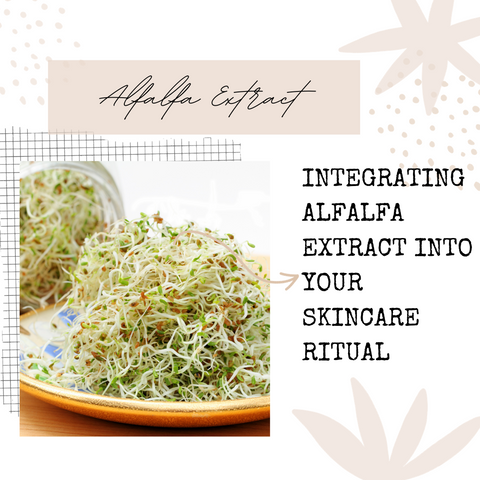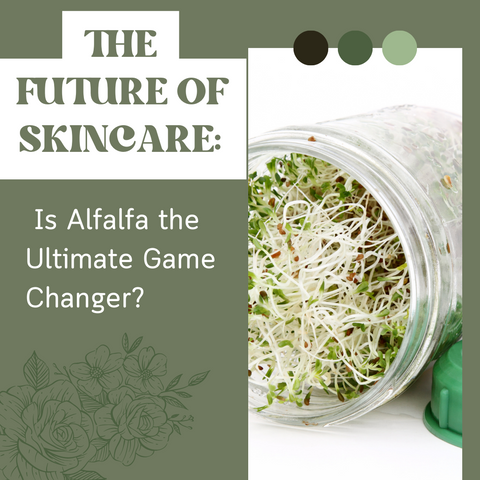Alfalfa extract, which is derived from the alfalfa plant (Medicago sativa), has attracted interest in a variety of businesses due to its possible health advantages and nutritional qualities. While lucerne is commonly used as animal feed, its high nutrient profile makes it appealing for human diets and cosmetics. In this blog, we will look at some major elements that emphasise the potential benefits of lucerne extract.
The Prowess of Alfalfa: Ancient Herb, Modern Beauty

Alfalfa, scientifically known as Medicago sativa, is a perennial herb with a centuries-long history and is well-known for its numerous applications in traditional medicine and modern beauty routines. This plant, known for its high nutritional content and medicinal benefits, has made its way into a variety of cosmetic formulas, providing a natural approach to skincare and wellbeing. While alfalfa exhibits promising potential in promoting beauty and wellness, further research is needed to fully understand its effects and optimal utilization. Integrating alfalfa into your beauty regimen or diet should be approached mindfully, considering individual health conditions and potential interactions. Consulting a healthcare provider before use is advisable for personalized guidance.
Historical Use of Alfalfa in Skincare: A Glimpse Back
Alfalfa, which has long been recognised for its therapeutic benefits, has a long history in skincare practises throughout civilizations. While its use in ancient skincare rituals has not been explicitly documented, the herb's nutritional value and potential health benefits have contributed to its inclusion in traditional skin-care remedies.
-
Historical Context: Alfalfa was used in traditional Chinese medicine and Ayurveda for its believed health advantages, improving overall well-being, which may have indirectly helped skin health. Alfalfa's high vitamin and mineral content made it a popular element in ancient medicine, implying that it may play a role in promoting skin health from within.
-
Traditional Applications: Historically, alfalfa was commonly used in teas, tonics, or as part of a diet to treat a variety of health problems. The belief in its ability to improve overall health may have contributed indirectly to better skin health. While there is limited documentation of alfalfa's direct use in skincare, its nutrient profile and historical use in natural remedies indicate its potential application in previous topical formulations. However, historical evidence of its direct use on the skin may be less common than that of its internal use.
-
Modern Adaptation: Alfalfa extract has recently found its way into modern skincare formulations due to its nutritional richness and antioxidant properties. Beauty products are now utilising alfalfa's ability to nourish, hydrate, and rejuvenate the skin. Its antioxidant content has led to its inclusion in anti-aging skincare products that aim to reduce signs of ageing such as wrinkles and fine lines.
-
Contemporary Insights: While historical records may not explicitly mention alfalfa's use in skincare, scientific evidence is mounting that it has antioxidant, anti-inflammatory, and potential skin-beneficial properties. With a growing interest in natural skincare and wellness, consumers seek products containing natural ingredients such as alfalfa, which contributes to its inclusion in various beauty and skincare formulations.
Active Components: Why Alfalfa is the Talk of the Town
Alfalfa, which is sometimes referred to as a superfood due to its outstanding nutrient profile, has a number of active components that contribute to its popularity in health, wellness, and skincare:
-
Phytochemicals and Nutrients: These natural alfalfa compounds are thought to have cholesterol-lowering properties and may aid in detoxification. Alfalfa contains flavonoids such as quercetin and kaempferol, which have antioxidant properties and aid in the fight against free radicals and oxidative stress. Alfalfa is high in vitamins A, C, E, and K, which help with skin health, collagen production, and overall antioxidant protection. It contains essential minerals like calcium, potassium, phosphorus, and iron, supporting various bodily functions and potentially benefiting skin health.
-
Amino Acids: Alfalfa contains a variety of amino acids, which are the building blocks of proteins. These amino acids help to maintain healthy skin by aiding in collagen production and repair.
-
Chlorophyll: Alfalfa's green color comes from the presence of chlorophyll, which also has anti-inflammatory and detoxifying properties. Chlorophyll is thought to help with wound healing and skin rejuvenation.
-
Antioxidants: Alfalfa is high in antioxidants, such as beta-carotene and other carotenoids, which protect the skin from free radical damage, potentially reducing signs of ageing.
-
Plant Estrogens: Alfalfa contains phytoestrogens, which are thought to help with hormonal balance and may benefit skin health, especially in menopausal women, by supporting collagen and skin elasticity.
-
Anti-Inflammatory Compounds: Some research suggests that alfalfa may have anti-inflammatory properties, which could help with the management of inflammatory skin conditions like acne or eczema.
While research supports its potential benefits, it is important to proceed with caution when considering incorporating it into your skincare regimen or diet, to ensure it aligns with individual health needs and potential sensitivities.
Alfalfa’s Power against Environmental Stressors
Alfalfa, with its high nutrient content and bioactive compounds, may provide protection against environmental stressors that affect overall health and skin condition:
-
Antioxidant Properties: Alfalfa is high in antioxidants such as vitamins A, C, and E, as well as flavonoids and other phytochemicals. These antioxidants scavenge free radicals produced by environmental stressors such as pollution and UV rays, thereby lowering oxidative stress on the skin.
-
Potential Anti-Inflammatory Effect: The anti-inflammatory qualities of lucerne are attributed to the presence of specific flavonoids and chlorophyll. These compounds might help lessen skin irritation brought on by allergies and other environmental stressors. Alfalfa's anti-inflammatory properties may aid in the development of a strong skin barrier, lowering skin irritation and enhancing resilience to environmental stresses.
-
Detoxification Support: The process of detoxification is linked to chlorophyll in alfalfa. Eliminating toxins and impurities accumulated from exposure to environmental pollutants may aid in skin purification. Some people think that alfalfa's possible detoxifying qualities help to unclog pores, which may help to prevent or treat acne.
-
Collagen Support and Repair: Alfalfa contains amino acids that aid in the synthesis of collagen and skin repair, possibly preventing damage brought on by stressors in the environment. By supporting collagen synthesis, alfalfa may help maintain skin elasticity and firmness, reducing the visible effects of environmental stressors.
-
Considerations: Alfalfa-based skincare products could provide a natural way to protect the skin from environmental stressors. However, since each person's reaction is unique, patch testing and gradual integration are advised. Although alfalfa has potential benefits, the best way to combat environmental stressors is to take a holistic approach that includes a healthy lifestyle, enough sun protection, and skincare routines specific to your skin type.
Delving into Alfalfa's Age-Defying Qualities

The age-defying properties of lucerne stem from its nutrient-rich composition and various bioactive compounds that may contribute to promoting youthful skin and combating signs of ageing, such as antioxidant richness, skin hydration and nourishment, anti-aging compounds, cellular repair and regeneration, holistic approach, and cautionary notes.
Waving Goodbye to Wrinkles with Alfalfa
The presence of bioactive compounds and a variety of nutrients in alfalfa has been linked to potential benefits that may help reduce the appearance of wrinkles:
-
Protection from Free Radicals and Preserving Collagen through Antioxidants
-
Skin nourishment and hydration, including nutrient support and moisture retention
-
Chlorophyll Benefits and Amino Acids for Cellular Repair and Regeneration
-
Topical applications and internal consumption are examples of holistic skincare and wellness practices.
Hydration and Elasticity: Alfalfa’s Dual Magic
Alfalfa's qualities improve skin elasticity and hydration, providing a twofold skincare benefit:
Hydration:
-
Vitamin Content: Alfalfa contains a lot of vitamins A, C, and E. Vitamin E, in particular, aids in moisture retention, keeping the skin hydrated by preventing water loss.
-
Mineral Support: Alfalfa contains essential minerals such as potassium and calcium, which help to regulate moisture levels in the skin and keep it hydrated.
-
Soothing and Nourishing: Some alfalfa compounds have soothing properties, potentially calming dry or irritated skin while nourishing it with nutrients that support overall hydration.
Elasticity:
-
Collagen Support: Alfalfa contains amino acids that are essential for collagen synthesis, a protein that is necessary for skin elasticity. Supporting collagen production helps to keep skin firm and supple.
-
Antioxidant Protection: Antioxidants in alfalfa, such as vitamins A and C, help to protect against free radical damage. This preservation of skin structure may aid in the maintenance of elasticity and the prevention of sagging.
-
Phytoestrogens: Some alfalfa compounds act as phytoestrogens, which may help balance hormone levels. This equilibrium may promote skin elasticity, particularly in mature skin affected by hormonal changes.
Holistic Skincare Application:
-
Topical Use: Applying skincare products containing alfalfa extract to the skin may give direct hydration, potentially increasing moisture levels and aiding in the maintenance of suppleness.
-
Internal Consumption: Alfalfa consumption as part of a balanced diet or supplement may contribute to overall skin health and hydration from inside, potentially resulting in better skin suppleness.
Cautions and Considerations:
-
Individual Reactions: Patch tests and professional advice are recommended because some people may have allergic reactions or sensitivities to alfalfa.
-
Consistency and Lifestyle: Achieving optimal hydration and elasticity requires consistency in skincare practises as well as a holistic approach that includes proper hydration, nutrition, and lifestyle habits.
From Dullness to Glow: The Alfalfa Transformation
The nutrient profile and revitalising properties of alfalfa can help turn dull skin into a radiant, glowing complexion.
Brightening Qualities:
-
Vitamin Enrichment: The vitamins A, C, and E found in alfalfa help to vitamin C brighten skin tone. Vitamin C, in particular,aids in the reduction of dark spots and discoloration, resulting in a more radiant complexion.
-
Antioxidant Power: Alfalfa's antioxidants fight free radicals, preventing skin damage that can lead to dullness. This protection aids in the preservation of skin radiance and clarity.
Nourishment and revitalization:
-
Hydration Support: Alfalfa's vitamins and minerals help to keep skin hydrated, preventing dryness, which can contribute to a dull appearance.
-
Cell Renewal: Alfalfa contains amino acids that promote skin cell renewal, potentially revealing fresher skin and reducing the appearance of dullness.
Detoxification and Rejuvenation:
-
Detoxifying Properties: Alfalfa's chlorophyll is associated with detoxification, potentially assisting in the removal of toxins that contribute to dull skin.
-
Anti-Inflammatory Properties: Some alfalfa compounds have anti-inflammatory properties, which help to soothe skin irritations that cause dullness.
Holistic Skincare Application:
-
Topical Application: Alfalfa extract in skincare products may help revitalise skin by providing direct nourishment and antioxidant protection, thereby improving skin radiance.
-
Internal Consumption: Including alfalfa in a well-balanced diet or as a supplement may help to improve overall skin health and radiance.
Considerations:
-
Individual Reactions: Patch tests are recommended because some people may have alfalfa sensitivities or allergies.
-
Consistency and Lifestyle: Consistent skincare practises and a holistic approach that includes hydration, adequate sleep, and a healthy diet are essential for achieving and maintaining skin glow.
Integrating Alfalfa Extract into Your Skincare Ritual

Because of its rich nutrient profile and skin-improving qualities, incorporating alfalfa extract into your skincare routine can have a number of potential benefits. Here's how to successfully incorporate alfalfa extract:
-
Cleansing: Look for facial cleansers that contain alfalfa extract. These can help to gently remove impurities while infusing nutrients into the skin, preparing it for subsequent skincare steps.
-
Toners: To moisturise and revitalise the skin, use toners or facial mists containing alfalfa extract. These products can help to balance pH levels, tighten pores, and add an extra layer of nutrients.
-
Serums and Essences: Alfalfa-infused serums and essences can offer a concentrated dose of nutrients to the skin immediately. These formulas can target specific issues like hydration, brightness, and anti-aging.
-
Moisturizers: Choose moisturisers containing alfalfa extract to give skin moisture, nourishment, and possibly antioxidant protection. This can assist in keeping your skin supple and avoiding dryness.
-
Masks: Weekly or biweekly lucerne extract masks might provide a revitalising treatment. They can refresh dull skin, replenish nutrients, and produce a beautiful complexion.
-
Eye Creams: In eye lotions, alfalfa extract can reduce fine wrinkles, puffiness, and dark circles around the eyes. These items can help improve skin suppleness and brighten the under-eye area.
Integration Suggestions:
-
Patch Test: Before fully incorporating a new product containing alfalfa extract, perform a patch test to ensure your skin does not react negatively or have allergies to the ingredient.
-
Maintaining Consistency: Use alfalfa-infused skincare products consistently for noticeable results.
-
Follow Directions: To maximise benefits and reduce the risk of irritation, follow the recommended usage instructions for each product.
-
Complement with Sunscreen: Alfalfa extract can help with skin protection, but it is important to use it in conjunction with sunscreen to protect against UV damage.
-
Consultation: Before incorporating alfalfa extract-based products into your routine, consult a dermatologist if you have sensitive skin or any skin conditions.
By incorporating alfalfa extract-enriched skincare products into your daily routine, you may be able to harness its nutrients, antioxidants, and revitalising properties to promote healthier, more radiant skin.
Picking Alfalfa-Infused Products for Maximum Benefit
Choosing the best alfalfa-infused products requires taking into account a number of factors in order to provide the most benefit to your skin. Here's a guide to help you decide:
-
Recognise Your Skin Type and Concerns: To combat dryness, look for hydrating formulations that include alfalfa extract. Consider oil-free or lightweight formulations containing alfalfa extract to avoid clogging pores. Choose products with light formulas and a few additional fragrances.
-
Examine the ingredient lists: For higher concentrations, look for products that list alfalfa extract or Medicago sativa high on the ingredient list. If you have sensitive skin, make sure the product is free of potential irritants such as parabens, sulphates, and artificial fragrances.
-
Product Type and Application: Concentrated alfalfa extract formulas can address specific issues such as ageing, hydration, and brightening. Choose based on your skin type for daily hydration and potential antioxidant benefits. If you occasionally need some deep nourishment and revitalization, try using masks containing alfalfa extract.
-
Brand Reputation and Quality: Choose goods from reputable companies that are renowned for their high standards and dedication to utilising natural ingredients. Look for certifications or labels that indicate organic or sustainable sourcing.
-
Think about Complementary Ingredients: Look for alfalfa products that include complementary ingredients such as hyaluronic acid for hydration or vitamin C for brightening.
-
Allergy Testing: Before applying full-face makeup, perform a patch test to check for any adverse reactions, especially if you have sensitive skin or allergies.
-
Reviews and Recommendations: Read reviews from other customers to determine the product's effectiveness and suitability for different skin types and concerns. If you have specific skin issues or allergies, consult a dermatologist or skincare professional for personalised recommendations.
-
SPF and Skincare Routine Compatibility: If used during the day, make sure it works in conjunction with your sunscreen to protect against UV damage. Check that the product fits into your skincare routine without interfering with or causing adverse reactions when used in conjunction with other products.
By taking these factors into account and understanding your skin's needs, you can choose alfalfa-infused skincare products that align with your skincare goals and maximise the potential benefits for your skin type and concerns.
Routine Tips: Making the Most of Alfalfa’s Potency
Consider the following tips to maximise the potency and benefits of alfalfa in your skincare routine:
-
Patch Test: Before using new products containing alfalfa extract, perform a patch test on a small area of skin to ensure there are no adverse reactions or allergies.
-
Consistency in Usage: Consistency is essential for achieving visible results. Incorporate alfalfa-infused products into your daily skincare routine and use them consistently as directed.
-
Cleansing: Begin your routine with a gentle cleanser to prepare your skin. This helps remove impurities and allows for better absorption of subsequent products containing alfalfa extract.
-
Prioritise Product Layering: Apply alfalfa extract products in the correct order, beginning with the thinnest and working your way up to the thickest. Toners or essences, for example, should be used first, followed by serums, and then moisturisers or creams.
-
Time of Application: Consider using alfalfa-infused products in both your morning and evening skincare routines to reap the benefits of their nourishing and protective properties all day and night.
-
Target Specific Concerns: Choose alfalfa-infused products that address your specific skin concerns, such as anti-aging serums, brightening treatments, or hydrating moisturisers.
-
Layering with Other Ingredients: Alfalfa extract can be used in conjunction with other skincare ingredients. Consider combining it with hyaluronic acid-containing products for hydration, niacinamide-containing products for brightening, or peptide-containing products for anti-aging benefits.
-
Sun Protection: Always finish your skincare routine with a broad-spectrum sunscreen during the day. While alfalfa extract may provide some antioxidant protection, sunscreen is essential for UV protection.
-
Tailor to Personal Preferences: Examine how your skin reacts to products containing alfalfa. Depending on what works best for your skin, adjust the frequency of use or combine them with other products.
-
Monitor Results: Keep an eye out for changes in the appearance and texture of your skin over time. Take note of any improvements or concerns and modify your routine as needed.
-
Professional Advice: If you have any specific skin conditions or concerns, consult with a dermatologist or skincare professional to ensure that the products containing alfalfa extract are appropriate for your skin type and needs.
You can potentially maximise the potency and benefits of alfalfa for your skin's health and appearance by incorporating alfalfa-infused products into your skincare routine with consistency, considering layering techniques, and adjusting to personal preferences.
Precautions and Optimizing Use for Different Skin Types
It is important to use alfalfa extract skincare products with caution and to tailor your application based on your skin type.
-
Normal Skin: Precaution: Although most people with normal skin types can tolerate products well, it is always advisable to perform a patch test to make sure there are no negative reactions. Optimization: Regularly use products infused with alfalfa to preserve skin's natural balance and brightness.
-
Dry Skin: Precaution: Although the hydrating properties of alfalfa can benefit dry skin, look for additional moisturising ingredients to prevent further dryness. Optimization: To hydrate and nourish, use rich moisturisers or serums containing alfalfa extract. This will help to lock in moisture and relieve dryness.
-
Oily or Acne-Prone Skin: Precaution: To prevent clogging pores or aggravating acne, look for alfalfa extract formulations that are non-comedogenic. Optimization: To hydrate without adding extra oil, look for light-textured serums or gels that contain alfalfa extract.
-
Sensitive Skin: Precaution: Check for potential irritants such as artificial fragrances or harsh chemicals in alfalfa-infused products. Optimization: Select gentle formulations with calming properties to soothe sensitive skin and ensure it tolerates the product well.
-
Combination Skin: Precaution: Balance is essential. Choose products that can be used on both oily and dry skin without causing imbalances. Optimization: Consider using alfalfa-infused products in specific areas based on skin needs. For example, a lightweight serum for oily areas and a richer moisturiser for dry areas.
-
Aging Skin: Precaution: To get the most out of alfalfa-infused products, look for anti-aging ingredients like peptides or retinoids. Optimization: To help support collagen and protect against free radicals, use serums or creams containing alfalfa extract to fight the signs of ageing.
Additional Tips:
-
Always do a patch test before adding new products to your regimen, particularly if you have allergies or sensitive skin.
-
To avoid potentially harmful reactions or overuse, follow the recommended usage instructions for each product.
-
Consider seeking personalised advice from a dermatologist or skincare professional, especially if you have specific skin concerns or conditions.
By being aware of your skin type's specific needs and potential sensitivities, you can select alfalfa-infused products that suit your skin and optimise their use for maximum benefits while minimising any potential negative effects.
The Future of Skincare: Is Alfalfa the Ultimate Game Changer?

Because of its nutrient-rich makeup and possible benefits for skin health, lucerne holds a lot of promise in the beauty business. While it isn't a panacea, it does add to the growing trend of using natural, plant-based compounds in cosmetics. Nutrient density, antioxidant power, adaptability, natural and sustainable trends, holistic wellness approach, research and innovation, and considerations are some of the reasons why lucerne might be regarded as a game changer. While it is not a stand-alone treatment, its high nutrient density, antioxidant content, and adaptability make it an appealing ingredient in skincare formulations. As research advances and formulas improve, lucerne may play an important role in influencing the future of skincare.
















